 Petzlover
PetzloverSchillerstovare is originated from Sweden but Walker Hound is originated from United States. Schillerstovare may grow 8 cm / 3 inches shorter than Walker Hound. Schillerstovare may weigh 7 kg / 15 pounds lesser than Walker Hound. Both Schillerstovare and Walker Hound has almost same life span. Both Schillerstovare and Walker Hound has almost same litter size. Both Schillerstovare and Walker Hound requires Low Maintenance.
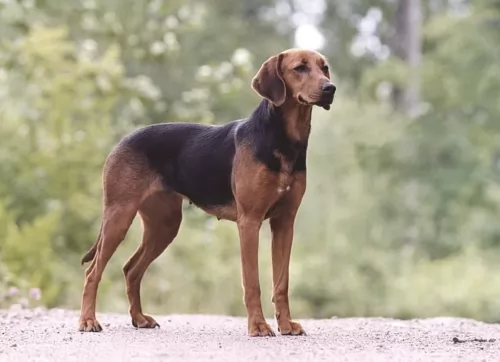 The Schillerstövare originated in Sweden, being named after a Swedish farmer, Per Schiller. After he died, the dog was named Schillerstövare in 1907, and was Sweden's first native dog breed.
The Schillerstövare originated in Sweden, being named after a Swedish farmer, Per Schiller. After he died, the dog was named Schillerstövare in 1907, and was Sweden's first native dog breed.
The Swedish Kennel Club recognised this dog in 1907 and it is also recognised by the Federation Cynologique Internationale as well as a number of minor kennels and dog clubs.
The dog has always been used as a hunting dog and the English Foxhound is the e foundation for this breed.
The Walker Hound is actually two different breeds today both descendant from the original Walker. They are the Running Walker Hound and the Treeing Walker Coonhound and mark their ancestors as the American Foxhound and the English Foxhound. The Treeing Walker is a breed developed in the United States when a “Tennessee Lead Dog” was crossed with a Walker Hound. The Running Walker is considered a Foxhound not a coonhound. They Running Walker does not have a treeing instinct and is not as common in hunting in the southern US as the Treeing Walker Coonhound.
In 1945 the United Kennel Club (UKC) recognized the Treeing Walker Coonhound and by the AKC (American Kennel Club) in 2012. They were developed to hunt and “tree” racoons – so the coonhound label. They also are capable of hunting bears, deer, bobcats and mountain lions. Their baying voice is distinctive that even at a great distance a hunter can recognize the voice of his dog.
Both types of Walkers are calm, gentle and friendly family dogs. The original Walker Hounds were bred in Kentucky by John Walker and George Maupin. The Walker Coonhound, Treeing was recognized as part of the English Coonhound breed by the UKC in 1905. In 1945, they were then recognized as their own breed by the UKC.
They have become the most popular hound competitor in coon hunt competitions. They are known for speed and an ability to catch more racoons in a shorter period of time than any other coonhound. They also tree squirrels, cougars. Opossums, roof rats and skunks.
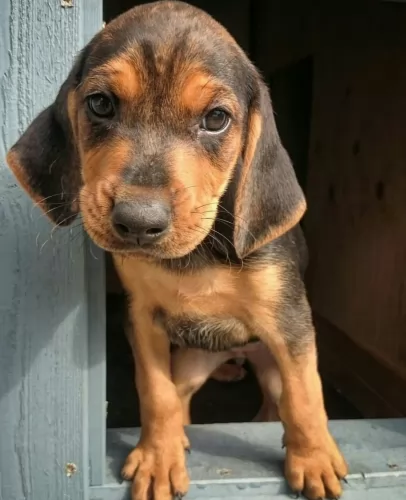 The Schillerstövare is a medium to large sized dog. They’re athletic and muscular.
The Schillerstövare is a medium to large sized dog. They’re athletic and muscular.
Standing at between 53–61cm in height and weighing in the region of 18–25kg, the coat of the dog is fairly short and harsh, with the color being black and tan.Sometimes you’ll see some white markings on the chest and paws.
The head is domed, the eyes brown, bright and alert and the ears of the dog are broad, medium length and floppy. The long tail is carried low or held out when running or alert.
If you allow your Schillerstovare to have puppies, you can expect between 3 to 7.
The Schillerstovare is a calm dog but he can get petty lively when there’s a game to be had. He gets on well with well disciplined children who have been taught to be kind and respectful to animals. He also gets on well with pets in the home. Just like with most other dogs, he will need to be trained and socialized as he is a strong willed, confident, dominant dog.
He is friendly and active but will be somewhat reserved around strangers.These dogs will require a lot of exercise and will need quite a bit of space too. They aren't well suited to small properties in the city. He will need a daily walk but also a chance to get off his leash and run free in the park. Other forms of exercise such as hikes, ball game and swimming will delight him.
This working dog is tall and lean with the males being somewhat larger than the females. They have broad skulls and hanging, long ears with a long muzzle. They have a soft expression in their dark eyes, straight legs and compact cat-like feet. The coat is smooth, glossy and fine. The traditional color is a tricolor or a bi-color in white with black and tan markings. The bicolors are white and tan or white and black. Their speed comes from the long , powerful and muscled legs and hindquarters along with the frame that is lean and streamlined.
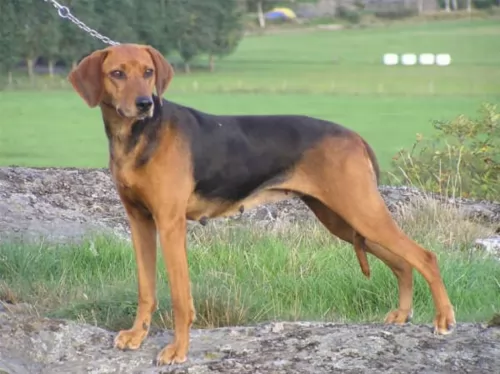 Schillerstovares are social, loving, friendly, loyal dogs who enjoy being around their human family. He’s going to need a lot of exercise, both mental and physical to keep him from boredom and frustration.
Schillerstovares are social, loving, friendly, loyal dogs who enjoy being around their human family. He’s going to need a lot of exercise, both mental and physical to keep him from boredom and frustration.
He will rely on you for at least a daily walk. He is strong-will and confident and will do well in a family where they are active and where they are firm, patient, kind and consistent in their behaviour towards him because then he ticks all th right boxes for being a splendid pet.
2.Special talents Walkers are capable of covering a lot of ground in a hurry. Speed and treeing instinct.
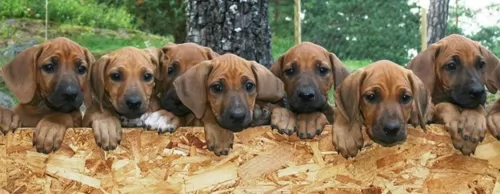 Even though your Schillerstovare is a healthy dog breed, hip dysplasia is a common dog disease that many dogs get.
Even though your Schillerstovare is a healthy dog breed, hip dysplasia is a common dog disease that many dogs get.
This is a skeletal disease when a dog’s hip joints become partially dislocated. It can be very difficult for your dog to get around, and he can also develop arthritis. It gets very sad when your dog doesn’t even want to participate in games anymore.
The Treeing Walker Coonhound is a fairly healthy breed needing to watch out for accidents on the hunting trail from shrubs, brush and tree limbs. They can become tick infested if you are not careful, especially in their long ears that flop on the side of their head. Clean their ears weekly and check them after every run in the woods.
They are also prone to hip dysplasia and eye issues. Hip dysplasia can cause lameness and/or arthritis. Before to keep the ear clear of debris and wax to avoid ear infections.
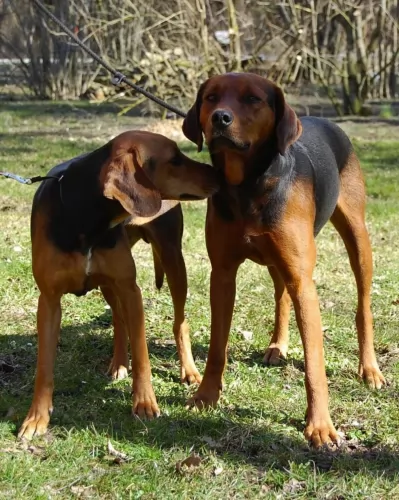 With his short coat, the Schillerstovare is considered a low maintenance dog and requires a minimal amount of grooming. Brushing should be done twice a week to remove loose hair. The harsh outer coat seems to repel dirt and dust.
With his short coat, the Schillerstovare is considered a low maintenance dog and requires a minimal amount of grooming. Brushing should be done twice a week to remove loose hair. The harsh outer coat seems to repel dirt and dust.
Trim your pet’s nails, check inside his ears for signs of redness, make sure his eyes are bright and clear and make sure he doesn’t have any unusual lumps on him.
Make sure his vaccines are up to date to avoid deadly canine diseases. Take him to the vet when you suspect he isn’t his normal self.
Dogs, just like humans, do well on good, nutritious diets. Feed a human lots of junk food and sweets and they’ll grow up to be obese and unhealthy. That's exactly how it is with dogs too. Some of the best commercially manufactured dog foods are convenient and they can be good if you look at the top brands. Look for ones that cater for your dog’s age, size, breed and activity levels. This dry kibble can be made more inviting for your pet when you include some homemade food.
Dogs just want simplicity so that they don’t battle with digestive problems. Boiled chicken, sweet potatoes, brown rice or pasta, carrots and spinach will be wonderful for him when you chop the food up and add it into the dry kibble twice a week. See his tail wag and his brown eyes light up when he smells this treat. Some raw meat added up occasionally will also contribute to your pet’s heath.
Make sure he is never without a constant supply of fresh, cool water.
1Feeding the puppy – don’t overfeed. Feed quality medium size breed 3-4 small meals per day
2.Feeding the adult – don’t overfeed. Feed quality medium size breed 1-2 small meals per day
running or hiking companion. long daily walks at a minimum. He loves to run and play with his family. Hunting and “coon trials” are his specialty and best ways to get exercise. He needs to run